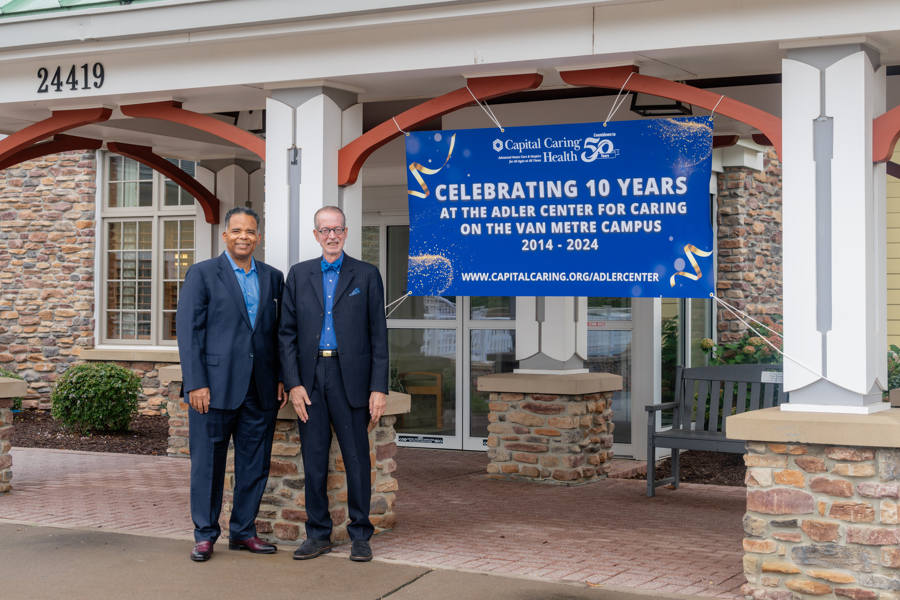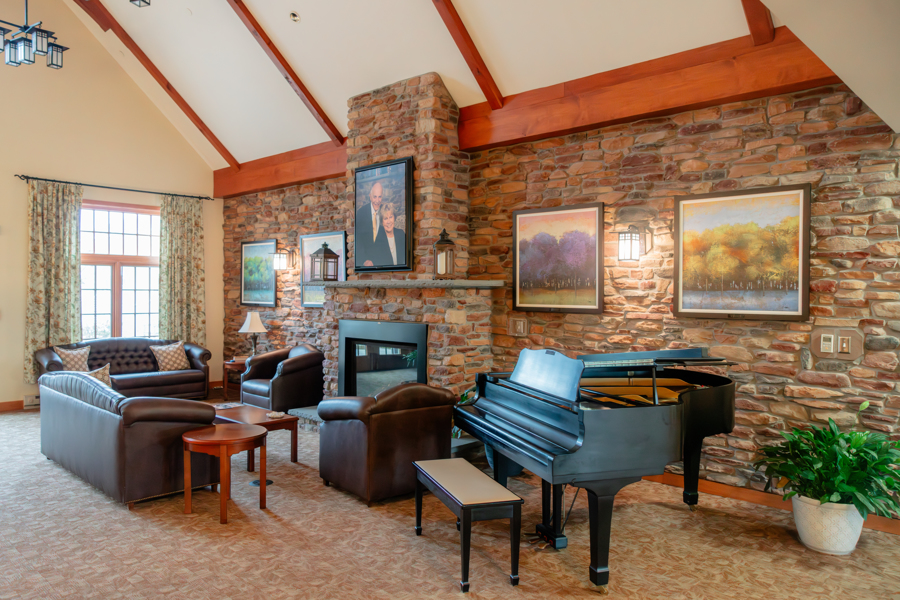10 Years of Compassionate Care at the Adler Center

Written by Dulcy B. Hooper | Photos by Caroline Gray
The historic village of Aldie is home to one of the most state-of-the-art inpatient hospice facilities in the country. It is the only facility of its kind in Loudoun County and one of only four in the state of Virginia.
Located on four acres, the 50,000-square-foot Adler Center for Caring on the Van Metre Campus is a special branch of Capital Caring Health, which was founded in 1977 and has been around since hospice care began in the United States. CCH operates the only two inpatient facilities in the region: the Adler Center and a practice housed within Sibley Memorial Hospital in the District of Columbia.
Now in its 10th year of operation, the Adler Center is a special 21-bed unit for when around-the-clock pain management and patient monitoring is necessary. In addition to the medical staff, there are social workers, chaplains, and volunteers available to serve the needs of patients and their family members.
Beyond treating adults, Capital Caring Health is one of the largest providers of specialized pediatric hospice care on the East Coast. It has a dedicated pediatric team and is designated as a regional center of excellence for children with life-limiting disorders. Unlike hospice services for adults, children in hospice care are not required to forego curative or life-prolonging treatments. In fact, nearly 20% of children in CCH’s palliative care and hospice program experience stabilization of their disease progression.
Along with private patient rooms, the Adler Center includes family rooms, playrooms, a library, two kitchens, and a nondenominational chapel. There are ground-level gardens, solariums, a pergola, walking paths, and a labyrinth, all available for the comfort and care of patients, family members, and visitors.

Beginning just this year, Capital Caring Health will become one of only two of the country’s 8,100 hospice providers to use its own customized vans and trained drivers, ensuring that patients enrolled in hospice care are picked up at local hospitals promptly and by knowledgeable staff and transported to their residence or to an inpatient facility.
Because Capital Caring Health is a nonprofit organization, it turns no one away. In fact, in its 47-year history, CCH has provided nearly $100 million in charity care and grief counseling at no cost to the families. Steve Cone, chief of communications, marketing, and philanthropy for Capital Caring Health, shares, “At the Adler Center, we provide a critical level of care regardless of a person’s ability to pay. This is a hidden gem in Loudoun County and more people need to know about it — and about the tremendous benefits provided to patients and their families.”
The word hospice derives from Latin “hospitum,” meaning hospitality or a place of rest and protection for the ill and weary. During periods of crisis or increased symptoms, short stays at an inpatient facility can help bring symptoms under control.
The goal of hospice care is to prioritize comfort, quality of life, and individual wishes, and includes addressing physical, emotional, spiritual, and social needs. Hospice care also includes assistance for patients’ families, helping them cope with what is happening and providing care and support to keep patients at home whenever possible.

Franklin Guerrero, a Loudoun County resident who recently joined Capital Caring Health as vice president of philanthropy, says, “To quote Margaret Mead, we are at our best when we serve others. A hospice inpatient facility such as the Adler Center is so regional and communal; it is truly at the heart of community-based caring. We bring our humanity to the forefront by such caring, and hospice allows us to retain this humanity to the very end.”
“These are very special facilities,” Cone says. “They are few and far between. We do everything we can to make it as comfortable as a home setting and least like a hospital.” Cone adds that the Adler Center is the only end-of-life care center he knows of that allows family and friends to visit patients around the clock — and allows pets to visit, too.
“We should all care about this unique Loudoun County facility,” he concludes. “Everybody is better off when patients are comfortable, pain free, and receiving the best care possible.” ML
Capital Caring Health
Adler Center for Caring
24419 Millstream Drive
Aldie, VA 20105
(703) 957-1777
capitalcaring.org
Creature Comfort: Robotic Pets
Capital Caring Health has been providing robotic pets to seniors regionally and nationally for more than three years. Now, in a joint initiative with Ageless Innovation (a manufacturer of robotic pets), CCH is distributing thousands of these pets to veterans in long-term care facilities around the country, as well as to others whose social isolation and physical limitations make them good candidates for such companionship.
These lifelike pets mimic how real pets feel, move, and sound — without the veterinary bills, special treats, or need for walks! The robotic pets, including dogs, cats, and birds, react interactively to light, sound, or a person’s voice, touch, or presence. For instance, a robotic dog might bark, wag its tail, or turn its head toward its human companion. The more their human companions interact with them, the more the robotic pets interact back.

There are many known benefits to incorporating pet therapy into hospice and palliative care programs, including the impact these pets have on social isolation, loneliness, and cognitive decline. For patients at Capital Caring Health’s Adler Center in Aldie, companion pets are offered as a component to patient care plans and have been found to be particularly valuable for pediatric patients, veterans, and individuals with dementia.
“The robotic pets are a hit with many patients in our care,” said Steve Cone, chief of communications, marketing, and philanthropy at Capital Caring Health. “In fact, we have seen some pretty remarkable outcomes.” Cone added that the pets are beneficial not only for patients, but also for patient families and members of the medical team.
Published in the October 2024 issue of Middleburg Life.








